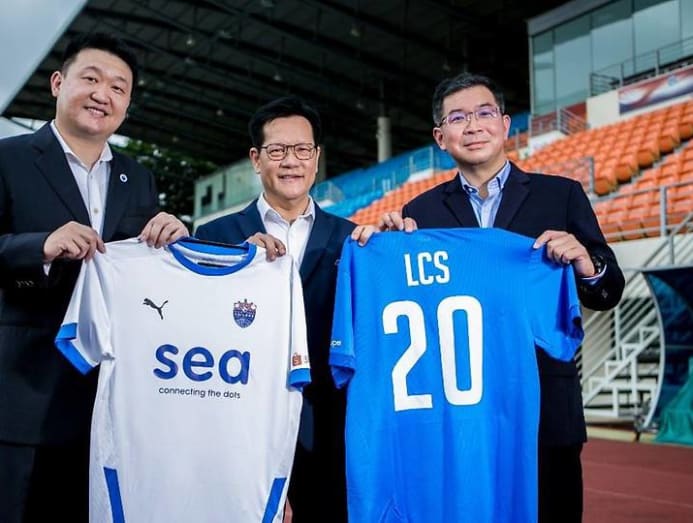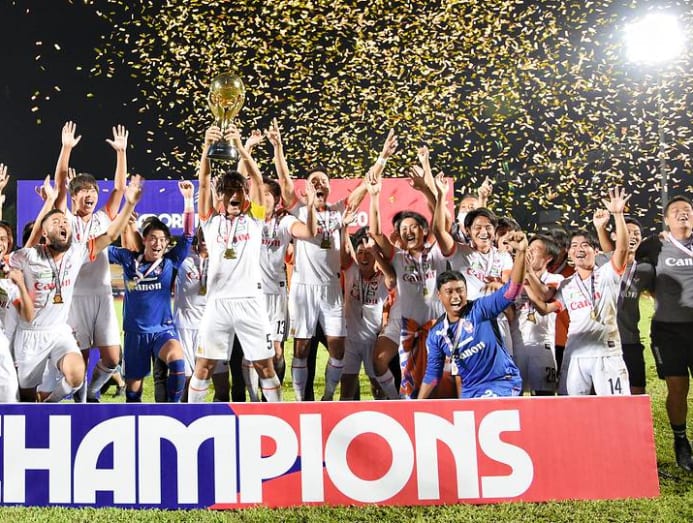Commentary: Can the Lion City Sailors reignite interest in Singapore football?
The Lion City Sailors have brought more money and ambition to the local scene. Can this take Singapore football to the next level, asks John Duerden.

SINGAPORE: Those in the Jalan Besar area last Friday evening (Sep 17) were treated to a rare sight: Fans queuing to watch a Singapore Premier League (SPL) match.
Tickets for the clash between Lion City Sailors and Albirex Niigata were sold at the stadium two hours before kick-off. Eager fans lined the street to snap up the available seats, limited to 1,000 due to COVID-19 capacity limits.
Unfazed, some unsuccessful fans even found a vantage point on nearby rooftops to check out the top two teams of this season’s table battle in the final stretch of the title race.
And exciting it was. Albirex equalised in the precious final seconds to make it a 1-1 draw, sending Sailors forward Faris Ramli down to his knees, pounding the ground in frustration.
Now before we get ahead of ourselves, we know one sold-out match alone - at a restricted capacity below pre-pandemic attendance - is hardly a sign heralding a new golden age for Singapore football. But the buzz around the game sure was thrilling to see.
SAILORS MAKING WAVES
Indeed, the Lion City Sailors have been a positive force for the SPL.
The team was rebranded in February 2020, after Home United was bought over by home-grown global company Sea and its billionaire co-founder and CEO, Forrest Li, who recently became Singapore’s richest person.

And what a difference that has made. Changes in the boardroom have translated to bold ambitions.
The world is sitting up. For the first time in a long time, there is overseas interest in the SPL, from profiles of the club appearing in influential UK-based magazine World Soccer, to stories on Li and his ambitions of taking Singapore football to the next level.
Of course there would be interest. The SPL suddenly had a famous billionaire team owner. It also saw its first privatised club make their mark, in a league where clubs usually depend heavily on subsidies from the Football Association of Singapore (FAS) and state lotteries.
And there’s big money backing these moves. The club hired Kim Do-hoon as head coach, the man who led South Korea’s Ulsan Horang-i to the 2020 Asian Champions League title. It also shattered local transfer records after forking out S$2.9 million for Brazilian midfielder Diego Lopes.
SETTING SIGHTS ON NEXT SEASON
The trophy might slip out of the Sailors’ reach after their heartbreaking Sep 17 draw. But whether they win the title this season is not the point for SPL and Singapore football.
The COVID-19 pandemic and the measures implemented to stem the spread in Singapore have made it difficult to gauge just how much of a difference the Sailors might have brought to the league.
For the first half of the 2021 season, no fans were allowed in stadiums and capacity limits gradually increased to 500 in August and to the present cap of 1,000.
According to the club, the Lion City Sailors have sold out 100 per cent of their home games. There has yet to be a spare seat at the Jalan Besar Stadium when the team has played.
When the Sailors played at the home of the Young Lions and Tanjong Pagar FC, those games sold out too.
The 2021 SPL season has been exciting, in part also because the Lion City Sailors are in a particularly intense title race with Albirex Niigata.
A local club has not lifted the SPL trophy since 2014, with Brunei’s DPMM twice victors and Japan’s Albirex going for number five. Having another local team, alongside Tampines Rovers who have been runner-up for several seasons, as a strong title contender can help to raise the stakes and tap on national pride to draw more supporters.
Singapore football writer Gary Koh shared with me his view that there is currently more intrigue than interest in the transformation of the Lion City Sailors, as privatisation puts the club at the whims and mercies of Forrest Li. He said, “People know more of the owner than the players, whose salaries are doubled after joining the club.”
Intrigue is a step in the right direction. But leading the league to a new level will take time. It remains to see how the 2022 SPL season will turn out, hopefully with fewer or no COVID-19 restrictions.
TAKING SINGAPORE FOOTBALL TO THE NEXT LEVEL
Could the Sailors’ turn in fortunes also benefit Singapore’s sights on qualifying for the 2034 World Cup?
Eleven of the 22 players called up to Singapore’s national team are from the Lion City Sailors, a sign of the club’s potential to energise our national football aspirations.

The Asia’s Champions League next year will be a milestone to watch, The Sailors will have an opportunity to show if the players can hold their own against other clubs from traditionally stronger nations such as South Korea, China and Japan.
More investment in players, good marketing and fan engagement can build excitement in the SPL.
The Lion City Sailors are in a similar situation as Johor Darul Ta’zim in 2012, just across the Malaysian border, after the crown price took ownership of the club and introduced sweeping changes.
In 2013, the Johor club signed Argentine star Pablo Aimar, raising interest in both the club and the national football league. Even though his time there was short-lived, it triggered greater investments, and the club have since solidified their domination with an eighth consecutive Malaysia Super League title.
The Sailors have similarly made great strides in engaging with football fans to further fuel passion, with more than 35,000 followers on Facebook and 19,200 on Instagram, almost double what most other SPL clubs have.
But for SPL and Singapore football to have a chance to shine, other teams must step up.
The SPL needs at least two strong local teams in the league, along with the foreign clubs, for healthy competition that lifts standards.
The Lion City Sailors have presented an exciting new side of Singapore football this year - one where fans clamour for tickets, and where teams invest on and off the pitch to match their ambitions to compete in Asia.
Taking Singapore football to the next level will not happen overnight, but neither will qualifying for the 2034 World Cup.
John Duerden has lived in Asia for 20 years and covers the region’s sporting scene. He is the author of three books including Lions & Tigers - The History of Football in Singapore and Malaysia (2017).









